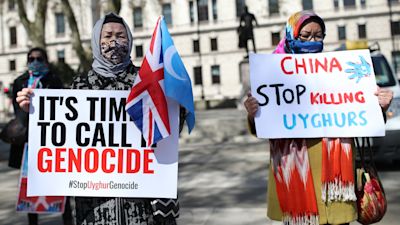China's treatment of Uyghur community may constitute crimes against humanity, UN says

A United Nations report into China's treatment of its Uyghur muslims has found the mass detention of hundreds of thousands of people could amount to crimes against humanity. ITV News Asia Editor Debi Edward reports
China's "arbitrary and discriminatory detention" of Uyghur Muslims in its Xinjiang region may constitute crimes against humanity, a damning UN report has found.
The report, issued by the outgoing UN human rights commissioner, Michelle Bachelet, assessed claims of abuse against Uyghur Muslims and other ethnic minorities.
The 48-page report concluded that "serious human rights violations have been committed" in Xinjiang province under the government's anti-terrorism and anti-extremism policies.
"The extent of arbitrary and discriminatory detention of members of Uyghur and other predominantly Muslim groups ... may constitute international crimes, in particular crimes against humanity," the UN Human Rights office said.
The Chinese government, which attempted until the last moment to stop the publication of the report, denies allegations of abuse.
Human Rights Watch and Amnesty International called on the UN and governments to set up an independent investigation into the human rights abuses. “Never has it been so important for the UN system to stand up to Beijing, and to stand with victims,” said John Fisher, the deputy director of global advocacy for the group.
Uyghurs are a mainly Muslim ethnic minority group of around 10 million people in the western region of Xinjiang.
The UN report made no mention of genocide, which some countries, including the United States, have accused China of committing in Xinjiang. The report was drawn in part from interviews with former detainees and others familiar with conditions at eight detention centres.
It said that descriptions of the detentions were marked by patterns of torture and other cruel and inhuman treatment and said that allegations of rape and other sexual violence appear credible.
The rights office said it could not confirm estimates that a million or more people were detained in the internment camps in Xinjiang.
But it added that it was “reasonable to conclude that a pattern of large-scale arbitrary detention occurred” at least between 2017 and 2019.
The report called on China to release all individuals arbitrarily detained and to clarify the whereabouts of those who have disappeared and whose families are seeking information about them.
In May, a cache of documents dubbed the Xinjiang Police Files gave unprecedented detail on the number of people being detained and the orders coming directly from President Xi Jinping to expand the country’s ‘’anti-extremism’’ campaign in the Xinjiang region.
The files revealed that an estimated 10% of the Uyghur population have or still are being detained in the Xinjiang region.
With many sentences upwards of ten years, that is essentially a life sentence for the many elderly people among those detained.
In May, ITV News Asia Correspondent Debi Edward reported on the publication of thousands of images of Uyghur Muslims detained in China's Xinjiang region
Ms Bachelet said she received pressure from both sides to publish - or not publish - Thursday's damming UN report and resisted it all.
Speaking ahead of the report's release, China's ambassador to the United Nations in New York said Beijing had repeatedly voiced opposition to it.
Zhang Jun said the UN human rights chief should not get involved in China's internal affairs. "We all know, so well, that the so-called Xinjiang issue is a completely fabricated lie out of political motivations and its purpose definitely is to undermine China's stability and to obstruct China's development," Zhang told reporters on Wednesday. "We do not think it will produce any good to anyone, it simply undermines the cooperation between the United Nations and a member state," he added.
Want a quick and expert briefing on the biggest news stories? Listen to our latest podcasts to find out What You Need To Know